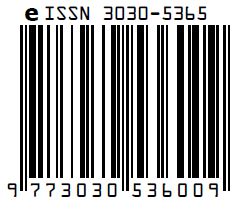The Relationship Between Husband’s Support and the Incidence of Postpartum Depression at PMB in Pariaman
DOI:
https://doi.org/10.31674/ijbb.2025.v02i02.005Abstract
Postpartum depression (PPD) is a prevalent psychological disorder that affects many women during the early postnatal period, posing significant risks to both maternal and infant health. Among various psychosocial determinants, the support provided by the husband plays a crucial role in either protecting against or contributing to the onset of PPD. This study aims to examine the relationship between the level of husband’s support and the incidence of postpartum depression among postpartum mothers receiving care at independent midwifery practices (PMB) in Pariaman, Indonesia. A quantitative analytic method with a cross-sectional design was used. The study involved 60 postpartum mothers selected through purposive sampling. Data were collected using a structured questionnaire that included demographic data, a husband’s support scale, and the Edinburgh Postnatal Depression Scale (EPDS). The results revealed that 29 mothers (48.3%) experienced symptoms of postpartum depression. Among those with low husband’s support, 83.3% were found to be depressed, while the prevalence was 64.7% among those with moderate support and only 12.0% among those with high support. The Chi-square test indicated a statistically significant association between husband’s support and postpartum depression (χ² = 23.870, df = 2, p = 0.000). These findings suggest that lower levels of spousal support are associated with higher risks of postpartum depression. Therefore, enhancing husband involvement during the perinatal period should be considered a key strategy in preventing postpartum depression and improving maternal mental health outcomes.
Keywords:
Postpartum depression, husband’s support, maternal mental health, EPDS, spousal involvement, midwifery services, Indonesia, perinatal careReferences
Ahmadpour, S., et al. (2023). Partner support and maternal functioning in the postpartum period: A cross-sectional study. BMC Pregnancy and Childbirth, 23(1), 287. https://doi.org/10.1186/s12884-023-05612-7
Amer, A. B., et al. (2024). Global burden of postpartum depression: Epidemiological trends and health system challenges. International Journal of Women's Health, 16, 141–152. https://doi.org/10.2147/IJWH.S432897
Antonioiu, B., et al. (2022). Emotional and instrumental support and its impact on perinatal mental health: A systematic review. Archives of Women's Mental Health, 25, 649–661. https://doi.org/10.1007/s00737-021-01126-8
Bhardwaj, A., et al. (2024). Engaging husbands in a digital mental health intervention for postpartum depression in low-resource settings. The Lancet Digital Health, 6(4), e318–e330. https://doi.org/10.1016/S2589-7500(24)00045-8
Brandão, T., et al. (2024). Social support and postpartum depressive symptoms: Mediating role of emotion regulation difficulties. Journal of Clinical Medicine, 13(23), 7150. https://doi.org/10.3390/jcm13237150
Cho, H. (2022). Association between social support and postpartum depressive symptoms in South Korea. Scientific Reports, 12, 21598. https://doi.org/10.1038/s41598-022-07248-7
Dennis, C. L., & Ross, L. E. (2006). Women's perceptions of partner support and conflict in the development of postpartum depressive symptoms. Journal of Advanced Nursing, 56(6), 588–599. https://doi.org/10.1111/j.1365-2648.2006.04059.x
Ekpenyong, M. S., & Munshitha, M. (2023). The impact of social support on postpartum depression in Asia: A systematic literature review. Mental Health & Prevention, 30, 200262. https://doi.org/10.1016/j.mhp.2023.200262
Henshaw, E. J., et al. (2023). Psychosocial predictors of early postpartum depressive and anxious symptoms: A dyadic study. BMC Pregnancy and Childbirth, 23, 5506. https://doi.org/10.1186/s12884-023-05506-8
Joo, E. Y., & Yoo, I. Y. (2015). Effect of a postpartum support program on maternal depression, maternal confidence, and infant care. Asian Nursing Research, 9(4), 312–317. https://doi.org/10.1016/j.anr.2015.09.002
Kebede, A. A., et al. (2022). Low husband involvement in maternal and child health services and intimate partner violence increases the odds of postpartum depression in northwest Ethiopia: A community-based study. PLoS ONE, 17(10), e0276809. https://doi.org/10.1371/journal.pone.0276809
Liu, X., et al. (2024). Attachment style, perceived partner support, and postpartum depression: A longitudinal cohort study in China. Women and Birth, In press. https://doi.org/10.1016/j.wombi.2024.04.002
Melchior, M., et al. (2020). Socioeconomic inequalities and postpartum depression: The mediating role of perceived partner support. European Psychiatry, 63(1), e92. https://doi.org/10.1192/j.eurpsy.2020.92
Ruan, J. M., et al. (2024). Postpartum depression and partner support during the early postpartum period. American Journal of Obstetrics and Gynecology, PMC10845228. https://doi.org/10.1097/AOG.0000000000000000
Yamada, F., et al. (2020). Attachment style and spousal support as predictors of postpartum depression: A Japanese cohort study. Midwifery, 89, 102799. https://doi.org/10.1016/j.midw.2020.102799





